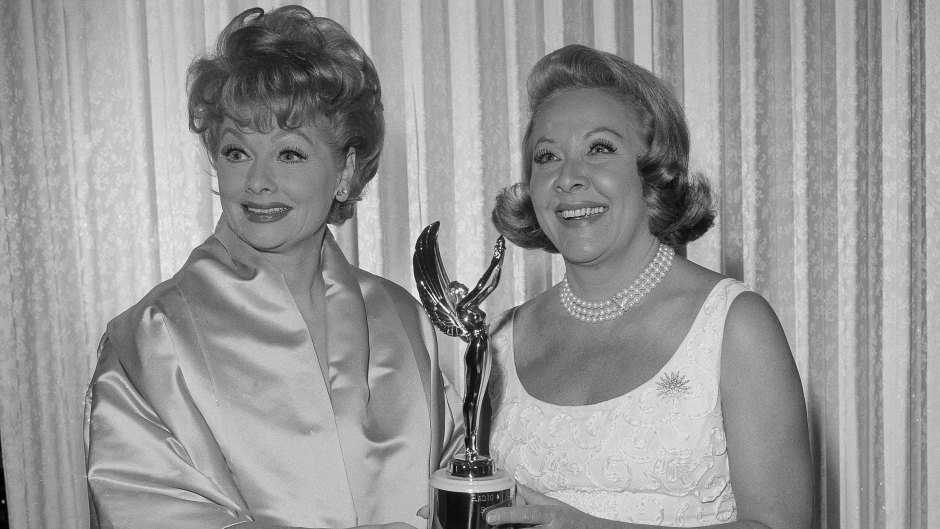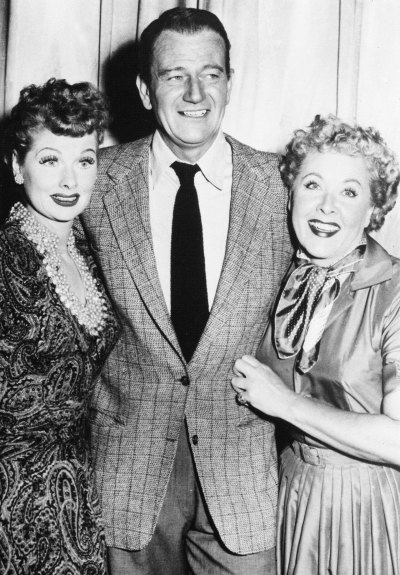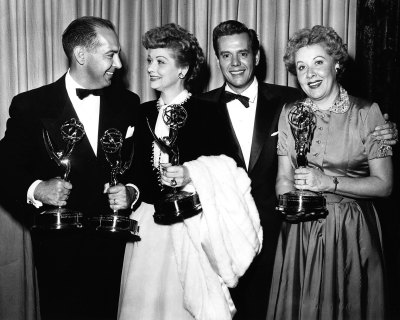
Uncredited/AP/Shutterstock
After a Life Full of Heartache Vivian Vance and Lucille Ball Had an ‘Extraordinarily Painful Goodbye’ in Her Final Days
Vivian Vance’s first meeting with Lucille Ball did not go well. “You don’t look like a landlady,” observed Lucy, who expected someone older, heavier and much less attractive than the former Broadway showgirl. Lucy also viewed Vivian with suspicion because her playboy husband, Desi Arnaz, had hired Vivian without consultation.
Despite this awkward start, Lucy and Vivian would go on to become one of America’s most beloved female comedy teams. Their 28-year personal friendship would also see them through mental illness, domestic abuse, traumatic divorces and worldwide TV stardom. “[We] were just like sisters,” gushed Vivian. “We adored each other’s company.”

Lucy’s frosty attitude began to thaw once she realized that Vivian was willing do to anything to make I Love Lucy great — even gain weight, bleach her hair and wear frumpy clothing to play Ethel Mertz. Lucy’s heart also warmed when she realized how nervous Vivian was about taping before a live audience. “She got me laughing so hard before my entrance that I didn’t have time to remember that I was so frightened,” Vivian recalled with gratitude.
As they grew closer, Vivian confided in Lucy about her upbringing and ongoing mental health struggles. Growing up, Vivian had often clashed with her mother, Mae, a religious fanatic who suffered from emotional collapses. “You want to be an actress, trying to lead men into sin? You are going to hell,” she fumed at young Vivian. Mae also warned her “that someday I’d have a nervous breakdown,” said Vivian, who kept a paper with her name and address in her purse just in case.
Unfortunately, her mother’s prediction came true in 1945 when Vivian was touring with the play The Voice of the Turtle. “One morning I woke up and the walls of my room seemed to be closing in on me,” recalled Vivian, who sought psychiatric help. Despite the prevailing taboos about discussing mental health in those days, Vivian became a lifelong advocate for therapy and emotional wellness.
She admitted that Lucy had a great influence on her. “Working with Lucille Ball, seeing all the strength she had, was good and healthy for me,” Vivian said.
At the start of their friendship, Vivian was wed to her third husband, Phil Ober, an actor. “He physically assaulted Vivian quite a few times,” says Kim Powers, author of Sidekicked, a play about Vivian’s life. “She would come to the studio with black-and-blue marks they had to cover with makeup.”
Eventually, Lucy got involved. “One day Viv came to work with a shiner,” she said. “That did it. I think I said to her, ‘If you don’t divorce him, I will!’” Vivian ended the marriage in 1959 and repaid the favor by supporting Lucy during her breakup with Desi. “We’ve been through a lot together, two husbands, two divorces,” Lucy admitted.
Vivian followed Lucy to The Lucy Show, which ran from 1962 to 1968. “I refused to even consider being in a continuing series without Vivian,” said Lucille, who came to rely on her friend’s comic sensibilities. “If something in the script wasn’t working, those two ladies would put their heads together and figure it out,” recalls Lucy’s former assistant Wanda Clark, to Closer.

But eventually, Vivian, who married her fourth husband, John Dodds, an East Coast-based book editor, in 1961, found commuting to LA too tiring. She asked for a reduced role on The Lucy Show and made only guest appearances on Lucy’s third sitcom, Here’s Lucy. But the friends stayed in touch, and when Lucy assembled the cast members for her 1977 TV special, Lucy Calls the President, Vivian was among them.
It would be their final TV performance together. “Vivian was complaining of not feeling well, and Lucy told her to see a doctor,” says Michael Stern, author of I Had a Ball: My Friendship With Lucille Ball. “That’s how Vivian found out she was sick.”
Vivian had been treated for breast cancer years earlier, but it had spread to her bones. Lucy traveled to her bedside twice before she passed away in 1979 at age 70. “They spent the afternoon telling stories, hugging and loving each other. When Lucy left, you could tell it was an extraordinarily painful goodbye,” recalls Paige Peterson, a close friend of Vivian, to Closer.
Lucy never got over Vivian’s passing. “No one could take the place of Vivian Vance in my life,” she said. “She was the greatest partner anyone could ever have.”
For more on this story, pick up the latest issue of Closer magazine, on newsstands now.








































